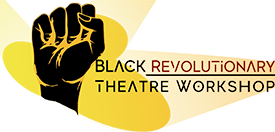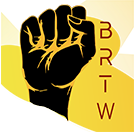The Grapevine Project
These discussions showed that they understood the situations, and that they kept themselves informed of events by what was termed the “grape-vine” telegraph.
– Washington, Booker T. “Chapter 1: A Slave Among Slaves.” pp 9. Up From Slavery.
Applications Currently Closed
Black Revolutionary Theatre Workshop welcomes applications from Black creatives who want to share works of nonfiction that center Black people, identities, and/or perspectives in one of America’s hundreds of news deserts. We will accept no more than 4 participants in the initial cohort. Each participant will receive professional development, hands-on support, and a small stipend. BRTW will share the final pieces on our website and select one of the final works to become the subject of a documentary theatre piece.
News, Nonfiction, and Theatre
Background
As artists, our ability to honor Black stories often relies on journalism, most especially, local journalism. Local journalism shines a necessary (and often singular) light on the political, economic, and social structures in areas often left underserved by national and international news. But local journalism is fading.
“We can measure the loss of local news in recent years in two ways: the loss of newspapers and the loss of journalists. In the 15 years leading up to 2020, more than one-fourth of the country’s newspapers disappeared, leaving residents in thousands of communities – inner-city neighborhoods, suburban towns and rural villages – living in vast news deserts. Simultaneously, half of all local journalists disappeared, as round after round of layoffs have left many surviving papers – the gutsy dailies and weeklies that had won accolades and Pulitzer Prizes for their reporting – mere “ghosts,” or shells of their former selves. Compounding the problem, there has been a lack of capital and funding available to support a variety of for-profit, nonprofit and publicly funded news organizations attempting to thwart the rise of news deserts.”
– Penelope Muse Abernathy. “News Deserts and Ghost Newspapers: Will Local News Survive?” pp 8. University of North Carolina Chapel Hill, Hussman School of Journalism and Media. 2020.
Since 2004, more than 1800 newspapers have closed around the United States. In addition to our increasing consumption of digital media since the new millennium, we’re also becoming increasingly accustomed to consuming information for free. While consumer behavior certainly contributes to the decline of local newspapers, these stalwart fixtures of local accountability also face another rising threat: private equity.
Private equity and leveraged buyouts are behind more than half a million lost retail jobs and around 750,000 related supplier/distributor jobs over the past 10 years, and this destabilizing trend has not only expanded to local news, it’s resulted in the loss of hundreds of jobs and dozens of newspapers. Moreover, as dozens of local newspapers continue to shutter in the wake of the coronavirus pandemic, we are only beginning to see how this public health crisis will heap gasoline on this particular fire.
The Grapevine Project
Capacity
Black Revolutionary Theatre Workshop is not a news organization, nor do we have the capital to seed massive general operations funding to news rooms all around the country. While this project intersects with the dearth of support for emerging journalists and journalistic efforts in news deserts, this project ultimately serves emerging Black nonfiction writers who live in or are from news deserts and are willing to share their perspective on an under-reported hometown incident related to the local Black experience.
Why This
Information is power.
Black Revolutionary Theatre Workshop produces work featuring Black people and experiences, because silence empowers white supremacist violence. Representation forces audiences to reckon with our lives, triumphs, and struggles. As local newspapers around the country close, we lose opportunities to hold our systems accountable. We create darkness wherein corruption, bigotry, and propaganda can thrive. We depend on the selfsame structures of privilege that “made America great” while many of us toiled in the background.
Respectfully, fuck that.
BRTW is proud to announce The Grapevine Project as part of Revolution NOW! The Grapevine Project welcomes qualifying nonfiction writers (essayists, narrative nonfiction writers, and even emerging journalists) to shine a light on an underreported incident from their hometowns. Qualifying writers must be 18+ years or older, Black, from and/or residing in a news desert, and willing to actively commit to a 4-week program.
BRTW will also select 1 of the final stories to adapt into a documentary theatre project in 2021, for which the author will receive additional remuneration.
Professional Development
BRTW is thrilled to welcome Sahra Ali as a Program Consultant on this project. She is a writer and Diversity and Equity consultant, whose work has been published in Readers Digest, NorthStar Monthly, Hardwick Gazette, and Discover Publications. She will be hosting 2 virtual work sessions with program participants about the relationship between nonfiction and journalism and diversity and equity in nonfiction writing.
Sahra Ali’s Bio
Learn more about her here.
Apply Today!
Your Story
Qualifying stories must be relevant to Black people in your hometown. For the purposes of this program, your “hometown” can be a place where you are from, have lived, or are currently residing. The hometown must be a news desert, which will be defined as an area that does not receive dedicated news focus by more than 1 media source (i.e. a quarterly paper or local blog.)
We recognize that your story is in development, so focus on sharing the “who, what, when, where, how, and why.” Give us all the relevant context, and let your writing samples take on the labor of showcasing the quality of your writing.
Your Writing
You must share at least 1 writing sample. You may share up to 5 writing samples, but they cannot total more than 10 pages. For example, you can upload 1 writing samples that’s 6 pages and 4 more of 1 page each. You can also just upload a single 10-page writing sample. You should neither feel obligated nor encouraged to send 10 total pages. Just share writing samples that give a sense of your nonfiction writing style, capacity, and skill. If you can do that in 1 page, then you will have shared a strong writing sample. If you need 8 pages to do that, that’s fine, too.
SUPPORT BRTW TODAY
BRTW exists to disrupt any and all oppressive systems that marginalize Black people using narrative and performance as a methodology to recenter Black people and experiences. With economic, social, educational, healthcare, housing, and political injustice facing our community, BRTW aims to tackle the issues that impact us while becoming a beacon for Black opportunity within the arts.


